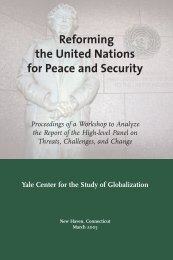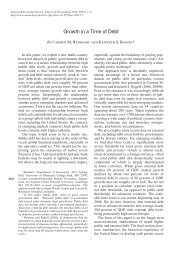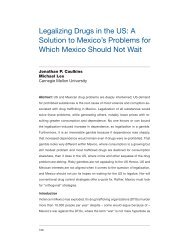The collapse of global trade, murky protectionism, and the crisis:
The collapse of global trade, murky protectionism, and the crisis:
The collapse of global trade, murky protectionism, and the crisis:
Create successful ePaper yourself
Turn your PDF publications into a flip-book with our unique Google optimized e-Paper software.
<strong>The</strong> <strong>collapse</strong> <strong>of</strong> <strong>global</strong> <strong>trade</strong>, <strong>murky</strong> <strong>protectionism</strong>, <strong>and</strong> <strong>the</strong> <strong>crisis</strong><br />
For maximum effect link surveillance to a meaningful G20 st<strong>and</strong>still<br />
commitment<br />
This recession poses new <strong>and</strong> surprising problems not encountered in earlier cyclical<br />
downturns. As a part <strong>of</strong> a plan to avoid harming world <strong>trade</strong>, <strong>and</strong> to make <strong>the</strong> surveillance<br />
mechanism operable, <strong>the</strong> G20 should adopt a "real" st<strong>and</strong>still in <strong>the</strong>ir use <strong>of</strong><br />
protective <strong>and</strong> market-disruptive measures.<br />
A "real" st<strong>and</strong>still commitment would not be like <strong>the</strong> watery promise <strong>the</strong> G20 made<br />
in November 2008 where leaders pledged to not take steps inconsistent with <strong>the</strong>ir<br />
WTO obligations. A real st<strong>and</strong>still – coupled with <strong>the</strong> surveillance mechanism –<br />
would provide maximum assurance that G20 nations' desire to stimulate growth<br />
extends beyond <strong>the</strong> borders <strong>of</strong> <strong>the</strong> world's largest economies. For some initial period<br />
(say until December 2010), <strong>the</strong> G20 should commit to implement:<br />
• No increases in any MFN applied rate <strong>of</strong> duty o<strong>the</strong>r than for technical<br />
adjustments (completion <strong>of</strong> HS transpositions, for example);<br />
• No increases in any customs fees, excise duties or consumption taxes applying<br />
to imports;<br />
• No new export subsidies in any form (as defined by <strong>the</strong> Hong Kong Ministerial<br />
Declaration);<br />
• No new export restrictions or export taxes;<br />
• No new buy local preferences at any level <strong>of</strong> government for goods or services<br />
contracts; <strong>and</strong>,<br />
• No new regulatory or technical requirements that would have <strong>the</strong> effect <strong>of</strong><br />
reducing market access for foreign services suppliers or introducing or increasing<br />
discrimination against foreign services suppliers.<br />
This mechanism needs to be in place now<br />
<strong>The</strong> alarming speed <strong>of</strong> <strong>the</strong> deterioration <strong>of</strong> <strong>the</strong> <strong>global</strong> economy <strong>and</strong> <strong>the</strong> widespread<br />
suspicion that we have yet to hit bottom argue in favour <strong>of</strong> putting this mechanism<br />
in place as soon as possible. <strong>The</strong> downside risks <strong>and</strong> costs associated with a new wave<br />
<strong>of</strong> <strong>protectionism</strong> are enormous <strong>and</strong> far too important to be ignored. We know what<br />
can happen if <strong>the</strong> mistakes <strong>of</strong> <strong>the</strong> 1930's are repeated – <strong>and</strong> this time it could even be<br />
worse. On <strong>the</strong> o<strong>the</strong>r h<strong>and</strong>, <strong>the</strong> cost to <strong>the</strong> G20 <strong>of</strong> taking <strong>the</strong> action we advocate is<br />
zero. In fact, any right thinking economist will tell you <strong>the</strong>re are important welfare<br />
benefits that flow from a liberal <strong>trade</strong> regime. We think <strong>the</strong> arguments in favour <strong>of</strong><br />
<strong>the</strong> new surveillance mechanism are compelling.<br />
About <strong>the</strong> authors<br />
Peter Gallagher is an independent consultant on <strong>trade</strong> <strong>and</strong> public policy based in Melbourne,<br />
Australia, <strong>and</strong> an associate <strong>of</strong> <strong>the</strong> Institute for International Trade. He consults to Australian<br />
firms, international organisations <strong>and</strong> agencies <strong>and</strong> has authored a number <strong>of</strong> books commissioned<br />
by WTO. He can be contacted through his website at petergallagher.com.au.<br />
67





